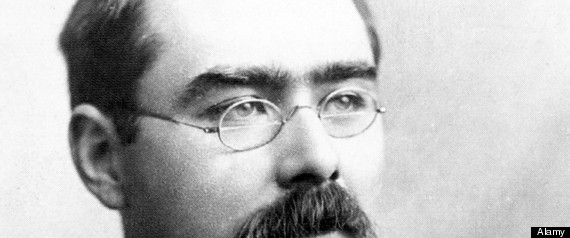
RUDYARD KIPLING: image source: huffingtonpost.com
On May 29, 2013, The Guardian reported that a letter written by author Rudyard Kipling in 1895 had come to auction. In the letter, it is purported that Kipling admitted to plagiarizing portions of The Jungle Book. The Guardian quotes the letter as saying, “I am afraid that all that code in its outlines has been manufactured to meet ‘the necessities of the case’: though a little of it is bodily taken from (Southern) Esquimaux rules for the division of spoils. In fact, it is extremely possible that I have helped myself promiscuously but at present cannot remember from whose stories I have stolen.” The letter recently sold for 2500 pounds according to the website for Andrusier Autographs.
There was an interesting commentary on the letter by Sarah Churchwell in The Guardian. She explains in the article how using ideas from other’s works was commonplace among many well-known authors and writers. She gives as examples Shakespeare who often used historical events as a basis for his plays and current filmmakers who make modern adaptations to classic novels. She also discusses how the concept of plagiarism came into being at approximately the same time as copyright laws were being established.
My take on the situation is that we are taking modern day ethical standards and applying them retroactively to past situations. The Jungle Book was published well over 100 years ago. Today’s authors have long pages of acknowledgements and thank you notes at the start or end of their novels that recognize the many people, organizations, or others who have contributed to the author’s knowledge of the subject contained within the book. In the past, these were not included because the standards were not the same. If they were, surely Kipling’s editors would have made certain that the “(Southern) Esquimaux” were acknowledged as well as the other long since forgotten groups or people from whom Kipling admitted to “helping himself”. Today’s works of fiction also generally carry a disclaimer about any similarities to real people, living or dead, is a coincidence. These are all examples of ways authors, editors, and publishers are working to avoid copyright lawsuits or accusations of plagiarism.
How will people in the future find fault with our current ethical standards? Of course, we cannot know, but surely the writers, editors, and publishers of the past saw no wrong with the way things were done in their time. Future technological advances may also change the way we credit our sources. The Internet has made it easier to track plagiarism and only time will tell what the future holds for us with regards to plagiarism. How will social media, for example, change the accepted perspective on what is public domain and what is personal property? Future generations will likely view our current ethics as outdated or even primitive just as we are now finding fault with published authors of the past.
